What is the story about?
What's Happening?
A report highlights the ancient Mayan farming techniques as a model for sustainable agriculture. The Maya civilization mastered complex land-use systems that maximized productivity while maintaining ecological balance. Techniques such as the Milpa system, which involves intercropping maize, beans, and squash, provide a model of ecological balance and mutual benefit between plants. Researchers are exploring these methods to address modern challenges of soil degradation, biodiversity loss, and climate change.
Why It's Important?
Mayan farming techniques offer valuable insights for modern sustainable agriculture, emphasizing biodiversity and soil health. These practices can help address global challenges such as food security and environmental sustainability. The report highlights the potential for integrating traditional knowledge with modern practices to enhance agricultural resilience.
What's Next?
Researchers and policymakers are encouraged to explore the application of Mayan techniques in contemporary agriculture. Investments in research and education can support the adoption of sustainable practices. Collaboration between indigenous communities and scientific institutions is crucial to preserve traditional knowledge.
Beyond the Headlines
The report emphasizes the cultural significance of Mayan farming and the need to respect indigenous knowledge. Ethical considerations include the protection of traditional practices and the promotion of sustainable development.















